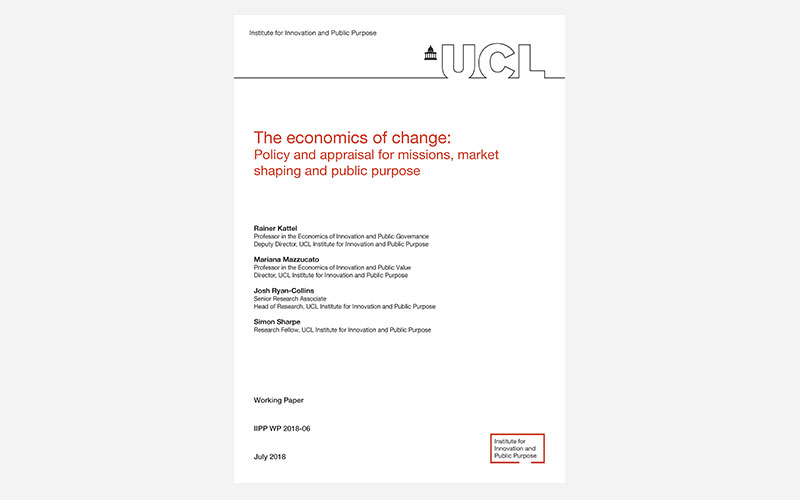The economics of change: Policy and appraisal for missions, market shaping and public purpose

31 July 2018
UCL Institute for Innovation and Public Purpose (IIPP) Working Paper Series: IIPP WP 2018-06
Authors
- Rainer Kattel | Deputy Director, Professor of Innovation and Public Governance, UCL Institute for Innovation and Public Purpose
- Mariana Mazzucato | Director, Professor in the Economics of Innovation and Public Value, UCL Institute for Innovation and Public Purpose
- Josh Ryan-Collins | Head of Finance and Macroeconomics, Senior Research Fellow, UCL Institute for Innovation and Public Purpose
- Simon Sharpe | Research Fellow, UCL Institute for Innovation and Public Purpose
Reference
Kattel, R., Mazzucato, M., Ryan-Collins, J. and Sharpe, S. (2018). The economics of change: Policy appraisal for missions, market shaping and public purpose. UCL Institute for Innovation and Public Purpose, Working Paper Series (IIPP WP 2018-06). https://www.ucl.ac.uk/bartlett/public-purpose/wp2018-06
Abstract
Policymakers are increasingly embracing the idea of using industrial and innovation policy to tackle the ‘grand challenges’ facing modern societies. To do so requires a fundamental reappraisal of the role of the public sector that goes beyond the traditional ‘market failure’ framework derived from neoclassical welfare economics to a ‘market co-creating’ and ‘market-shaping’ role. Such policies may have significant spillover effects and involve structural changes to the economy. This report explores the implications of this approach for policy appraisal and evaluation. We argue that market-shaping, ‘mission-oriented’ policies should be evaluated on three levels: enhancing user experience and engagement; expanding technological frontiers; and broader macroeconomic multiplier effects. To do this, governments need to embrace and experiment with new tools and methodologies focused on user needs and dynamic - rather than allocative - efficiency. These include techniques from service design research that focuses on user experience and co-creation practice; and strands of evolutionary economics that focus on shifting and shaping technology and innovation frontiers and managing complex systems under conditions of uncertainty.
 Close
Close

